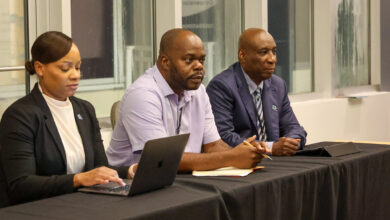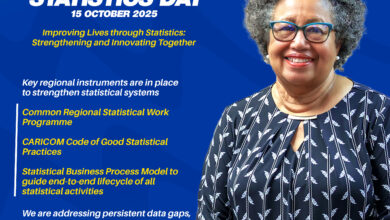Dr. Jacques Diouf, Director General of the Food and Agriculture Organisation (FAO) has presented clear indications of the Caribbean net agriculture trade position to Ministers of Agriculture of the Caribbean Community.
In his remarks at the opening ceremony of the one-day 21st Special Meeting of the Council for Trade and Economic Development (COTED) today at the CARICOM Secretariat, Georgetown., Dr Diouf said the Caribbean net agriculture trade position moved from a surplus of US$3B at the end of the 1980s to a deficit of US$2.2B between 2002 and 2004. Pointing to the steps the FAO and CARICOM had been taking to boost the sector, Dr Diouf said: “We need to build on this momentum to try to get a serious programme with the adequate critical matter of funding if we are to change the situation and reverse the trend, particularly in this period when we are seeing the consequences of globalization and liberalization on the agricultural economy of CARICOM countries particularly as it relates to sugar, bananas, coffee etc”.
“I also would like to take this opportunity to say that we need action also at the national level; we need leadership at the national level, on the part of the Heads but also on the part of Ministers of Agriculture and the Ministers of Finance, because … 90 per cent [of the sector programmes] is to be implemented at the national level… Unless we have the commitment of the Heads supporting their Ministers of Agriculture and also ensuring the full participation of their Ministers of Finance, it would be very difficult to achieve the goal we set of launching concrete programmes by January 2008,” Dr. Diouf said.
CARICOM Deputy Secretary General, Ambassador Lolita Applewhaite placing the meeting in context, said it was called largely in response to a request from the Dr Diouf to meet with the political directorate of the regional agricultural sector.
Highlighting the high level of collaboration between CARICOM and agricultural organizations such as the FAO and Inter-American Institute for Cooperation on Agriculture (IICA), Ambassador Applewhaite said such collaboration is needed if the Community’s prospects of a Single Market and Single Economy are to be realized.
“The creation of a Single Economic Space, with its removal of barriers to trade in goods and services and the freedom of movement of the people of the Region, holds the potential for the solution of most of the problems facing us such as unemployment and poverty prevalence. Agriculture is no exception. Indeed access to each other’s resources of land and water could be equally a part of our Region’s Functional Co-operation Strategies as those we may have existing for Health and Education. We just need to put the respective institutional arrangements in place,” the Deputy Secretary General said.
The Meeting, chaired by Belize Minister of Agriculture and Fisheries, The Hon. Vildo Marin, was held against the background of regional commitment to Strengthening Agriculture for Sustainable Growth and Development in the Caribbean Community, also known as The Jagdeo Initiative.





